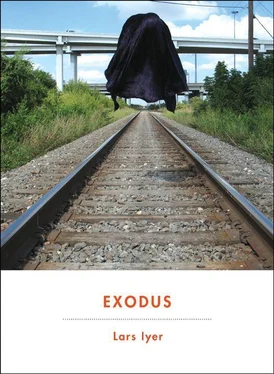I think my stomach betrays me, W. says, when, in fact, my stomach, with its endless problems, its growling and grumbling, acts only in my interests.
That’s why I look so bilious and green, W. says. And it’s why we had to seek out an emergency scheisse bar when we visited Freiburg. The emergency scheisse bar : isn’t that what we have to search out in every city, almost as soon as we arrive?
Manchester’s completely changed, I tell W., as we walk from the station. I hardly recognise the place. When did it happen? How did it happen?
We must have been asleep. We must have forgotten that the world was changing. We’ve been outflanked, we agree. Outrun.
A new world appeared while we were napping. A new world of glass and steel, of statement architecture , in the years since I left the northwest. Look at the skyline! Look what they’ve done!
Beetham Tower has something, even he has to admit that, W. says. It looks like the future as we used to imagine it — the science fiction future, all streamlined and silvery. But the rest of it?
These are not our times, we agree. But whose times are they? The times of investors and financiers, we agree, of gentrifiers and speculators. The times of public-private partnerships and gated communities. The times of steel-balconied monuments to credit. The times of consumer-entrepreneurs, selling their soul to Capital and then buying it right back …
Even I’m outraged, W. says. He sees me climbing up Beetham Tower like King Kong, and him screaming in my fist like Fay Wray.
Neat Plymouth gins on ice by the canal, musing on our failure.
There are some thoughts that will be forever beyond us, W. says. The thought of our own stupidity, for example; the thought of what we might have been had we not been stupid. The thought of what he might have been, W., had he not been dragged down by the concrete block of my stupidity … The thought of what I might have been, had my stupidity simply been allowed to run its course … W. shudders.
Oh, he has some sense of what we lack, W. says. More than I have, but then he’s more intelligent than I am. He has some sense that there’s another kind of thinking, another order of idea , into which one might break as a flying fish breaks the surface of the water. He knows it’s there, the sun-touched surface, far above him. He knows there are thinkers whose wings flash with light in the open air, who leap from wave-crest to wave-crest, and that he will never fly with them.
He lacks brilliance , that’s his tragedy, W. says. There is a dimension of thought, another dimension of life, which he will never attain. The murk of his stupidity has a gleaming surface … He half -understands, half -knows; but he doesn’t understand, he doesn’t know.
But isn’t that what saves him? W. says. For if he had understood, really understood, how immeasurably he had failed, wouldn’t he have had to kill himself in shame? If he had known, really known, the extent of his shortcomings, wouldn’t his blood have had to mingle with the water?
Then again, if he really understood, he wouldn’t be stupid, W. says. To know, really to know, would mean he had already broken the surface.
None of this troubles me, he knows that, W. says. Astray, that’s what I’ve always been. Missing, in some sense. Absent without leave. — ‘You’re a deserter by inclination. You know nothing of loyalty, nothing of the cadre’. I’m not loyal to philosophy , W. says. I know nothing of it, the demand of thought.
‘What are you interested in?’, W. asks me. ‘What, really? Because it’s not philosophy, is it? It’s not thought’. Still, I like reading about philosophy and reading about thought, that much is clear. It exercises some kind of fascination over me, W. says. There’s something in me that responds. There’s something that is left in me of the good and the true.
When do you work ?’, W. says. ‘When do you have ideas?’ But he knows the answer. I am too busy to work, I tell him. I am too troubled to have ideas.
I’ve been institutionalised, W. says. Bureaucratised! It was when I became the perfect administrator that I stopped doing any real philosophical work.
What do I do in my office? W. asks. He knows the answer: go through emails. Fill out spreadsheets. Scour management communiqués with bloodshot eyes. And what do I do in the evenings? He sees me, in his mind’s eye, W. says, opening a bottle of wine in the squalor of my flat, after a day at work. He sees me, booting up my laptop, getting ready to write.
But that’s my problem! W. says. I think that writing is the same as having ideas, when in reality, they are entirely different. You have to stop writing to have an idea, W. says. You have to pause and wait. Thought has to come to you, not you to it. You can’t force thought by writing.
My writing is really the enemy of philosophy, W. says. Its waters close over the head of thought. Its dark matter occludes the sprawl of stars and planets. Sometimes he dreams that my non-thought is larger than thought, W. says. That it is truer , somehow. More in keeping with our times.
Of course, it’s worse for me when I actually stop writing, W. says. It’s worse when I collapse into my bed and try to sleep. He pictures me, staggering around my flat in the early hours, amidst the squalor, amidst the mould spores and the flies, preparing for bed. He sees me, drunk, or half drunk, on Tesco’s cheapest wine, ranging around my flat like the abominable snowman, with my dressing gown flapping about me …
‘You can never sleep, can you? You’ve never been able to sleep’, W says. He sees me, lying sleepless in bed, full of great paranoid imaginings about the way I think they’ll sack me. He sees me, lying there, quite panicked, fearing that I’ll be sent back to the dole queue. And he sees me, falling asleep at last, collapsing into unconsciousness at last, just as dawn breaks, and the birds start singing, just as, at the opposite end of the country, W. is waking up, ready to begin his studies. He sees me, dreaming fitfully about working out my notice and exit interviews . He sees me, mouthing the words, No! No! in my half-sleep … And he sees my eyes open again, the Leviathan awake, rolling out of my bed like a Spital Tongues Gargantua …
I take W. on a tour of my emergency Scheisse toilets in the city. The ones in the Royal Exchange , opposite the theatre they built within the vast interior of the building. The ones in the Central Library , in the basement beneath the many floors of books. The ones in the House of Fraser , on an underground corridor between different menswear departments. And I show him the secret toilet in Waterstone ’s, hidden in a corner of the top floor.
W.’s impressed. A toilet for every part of the city centre. I left nothing to chance!
Manchester lacks a river, W. says. It lacks an expanse. That’s why Mancunian thoughts are always claustrophobic thoughts, he says. It’s why Mancunian thinkers are constrained , trying to fight their way free.
And there’s the rain, brought by the terrible Westerlies, W. says. Manchester is particularly prone to Westerlies, which roll across its plain. The weather is so heavy here, W. says. So crushing .
The Mancunian thinker has constantly to struggle against melancholia, and thoughts of suicide, W. says. He thinks of Alan Turing, eating an apple he’d coated in cyanide. He thinks of Ian Curtis, hanging himself from the rope of a clothes-airer.
Sometimes, W. thinks that it’s only the destroyed thinker who can press thought towards what matters most. That it’s only destroyed thoughts that can think the whole. Is that why, despite everything, he reads my work so carefully? Is that why he still believes that I might have something to say ?
Читать дальше












